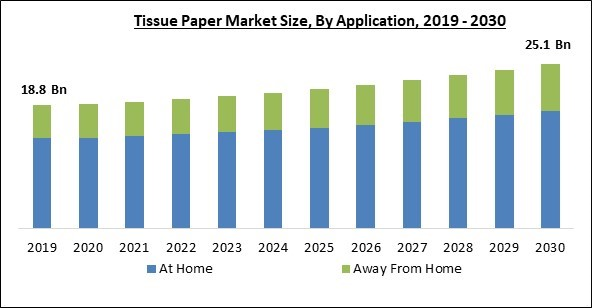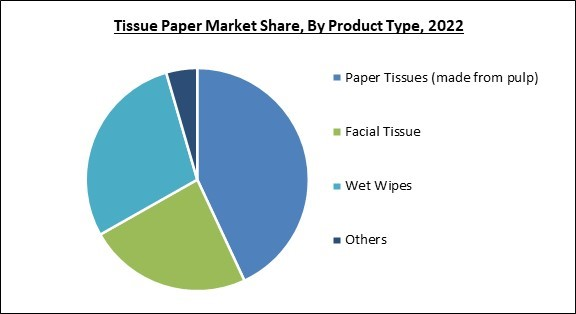Soft and very absorbent facial tissue papers are appropriate for facial applications. Facial tissues are commonly used in commercial settings Hence, Facial tissue segment is anticipated to capture approximately 1/4th share of the market by 2030. Multiple tissue paper manufacturers offer facial tissues with antibacterial and aromatic properties. Increases in living standards and disposable income positively affect facial tissue paper demand. In addition, the increase in expenditures for cosmetic care is contributing to the market growth. Many market players have also introduced tissues with micellar water infusion or makeup removing abilities. Some of the factors impacting the market are enhanced knowledge of hygiene, rising number of government initiatives encouraging environmentally friendly production, and chemicals in facial wipes.
It is anticipated that the growing incorporation of an array of natural components into the manufacturing process of tissue paper, like almond oils, aloe vera, etc., which help prevent the spread of bacterial infections, will contribute to the growth of this market. The demand for tissue paper products is driven by the rising demand for hygienic, sanitary, and personal care items. Additionally, rising urbanization leads to substantial infrastructure investments that will boost tissue paper product demand in the coming years. Good personal hygiene involves keeping all external body parts tidy and healthy. It is vital for maintaining both physical and mental health. Poor personal sanitation creates an ideal environment for the development of microorganisms, leaving the body vulnerable to infection. Good hygiene allows families to avoid illness and spend less on health care. In certain circumstances, it can also ensure a family's social standing and help individuals maintain their confidence. As a result, facial tissue sales are anticipated to contribute to market expansion in the future years.
However, face tissues are primarily composed of chemicals to maintain hydration, effective and safe. Most cleansing cloths contain various compounds, such as triclosan, ethanol, parabens, and methylisothiazolinone (MI). The result is lackluster skin that generates excessive oil to mitigate for dehydration, which can also cause congestion and blemishes. Due to this, a sizeable percentage of consumers may not favor using facial tissues. Consequently, the market may experience sluggish growth.
Application Outlook
Based on application, the market is segmented into at home and away from home. In terms of revenue share, the at home segment dominated the market in 2022. Increasing consumer awareness of sanitation and personal hygiene is propelling the growth of this market segment throughout the forecast period. In addition to a rise in facial and moist wipe usage at home, this segment is anticipated to expand. In addition, environmental concerns and the demand for sustainable products are two of the market's most prominent trends.Product Type Outlook
Based on product type, the market is segmented into paper tissues (made from pulp), wet wipes, facial tissue, and others. In 2022, the facial tissue segment of the market generated an impressive revenue share. This results from the increasing demand for sanitation and facial hygiene among millennials worldwide. In addition, an increase in demand for eco-friendly and sustainable personal care and sanitation products is likely to generate additional opportunities for this segment, thereby substantially driving the growth of this market over the forecast period.Distribution Channel Outlook
By distribution channel, the market is categorized into offline and online segments. In 2022, the offline segment held the largest revenue share in the market. The offline market comprises specialty stores, supermarkets, hypermarkets, independent retailers, etc. The growing structured retail sector in India and China is expected to boost demand for tissue paper products in coming years. Additionally, the growth in HoReCa (hotel, restaurant, café) sector after the relaxation of COVID-19 movement limitations further propelled the demand for paper tissues.Regional Outlook
Based on region, the market is studied across North America, Europe, Asia Pacific, and LAMEA. Asia Pacific led the market in 2022 by generating the largest revenue share worldwide. Due to the region's high tissue paper consumption. In addition, the rising disposable income of the middle class and the transformation of lifestyles in developing nations are driving the expansion of this market. In the coming years, the increasing demand for facial tissues and moist wipes among millennials in this region is also anticipated to contribute to the expansion of this market.The market research report covers the analysis of key stake holders of the market. Key companies profiled in the report include The Procter and Gamble Company, Georgia-Pacific LLC (Koch Industries, Inc.), Kruger Inc., Kimberly-Clark Corporation, Essity AB, Naturelle Consumer Products Ltd, Solaris Paper, Inc., Seventh Generation, Inc. (Unilever PLC), Hengan International Group Company Limited, Asia Pulp and Paper Group Sinar Mas
Scope of the Study
By Application
- At Home
- Away From Home
By Product Type
- Paper Tissues (made from pulp)
- Facial Tissue
- Wet Wipes
- Others
By Distribution Channel
- Offline
- Online
By Geography
- North America
- US
- Canada
- Mexico
- Rest of North America
- Europe
- Germany
- UK
- France
- Russia
- Spain
- Italy
- Rest of Europe
- Asia Pacific
- China
- Japan
- India
- South Korea
- Singapore
- Malaysia
- Rest of Asia Pacific
- LAMEA
- Brazil
- Argentina
- UAE
- Saudi Arabia
- South Africa
- Nigeria
- Rest of LAMEA
Key Market Players
List of Companies Profiled in the Report:
- The Procter and Gamble Company
- Georgia-Pacific LLC (Koch Industries, Inc.)
- Kruger Inc.
- Kimberly-Clark Corporation
- Essity AB
- Naturelle Consumer Products Ltd
- Solaris Paper, Inc.
- Seventh Generation, Inc. (Unilever PLC)
- Hengan International Group Company Limited
- Asia Pulp and Paper Group Sinar Mas
Unique Offerings
- Exhaustive coverage
- The highest number of Market tables and figures
- Subscription-based model available
- Guaranteed best price
- Assured post sales research support with 10% customization free
Table of Contents
Companies Mentioned
- The Procter and Gamble Company
- Georgia-Pacific LLC (Koch Industries, Inc.)
- Kruger Inc.
- Kimberly-Clark Corporation
- Essity AB
- Naturelle Consumer Products Ltd
- Solaris Paper, Inc.
- Seventh Generation, Inc. (Unilever PLC)
- Hengan International Group Company Limited
- Asia Pulp and Paper Group Sinar Mas










